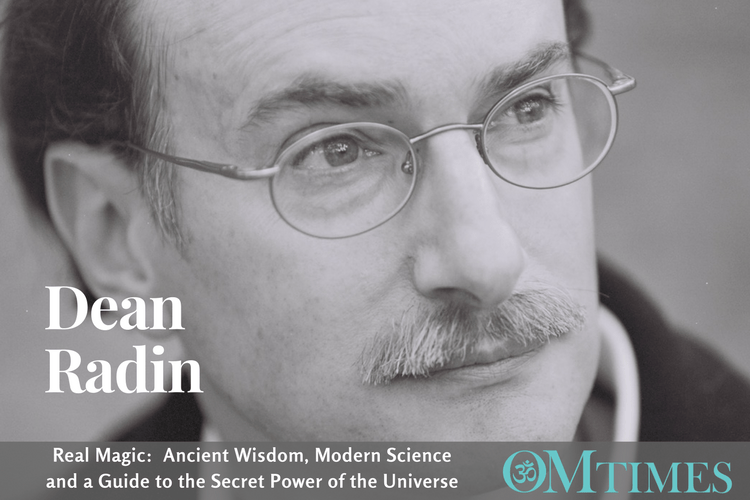Dean Radin: Real Magic, The Secret Power of The Universe

Sandie Sedgbeer: Were you manifesting each other, which one started it? It raises all kinds of questions. And of course, you say that the practical foundations of real magic are attention and intention.
Dean Radin: It’s just not intention and attention, but it’s doing that with very high levels of motivation and not in an ordinary state of awareness. So, an ordinary state of awareness, you can get small effects. We see those in the laboratory.
For big effects, it takes what a magician would call being in the state of hypnosis or Yogi would say being in a state of samadhi. These are very deep states of consciousness.
John was doing a dream yoga technique, so part of his intention was in the dream state, not in the ordinary state at all. And what I was doing was somewhat in an ordinary state, but a lot of it was contemplative. It was like walking meditation and very strong imagination. I was imagining what I wanted and drawing it, as well.
And so, this is relevant to the notion of spellcasting in magic, especially the idea of drawing, that when you, one method of magical practice is to draw literally like painting or sketching something that you want. But, it has a second meaning. You draw the thing you want, but it draws it to you. It’s like pulling it to you.
By the same token, spell casting has two meanings of the word spell. So, spell in a magical sense is you cast something out into the world, and you hope you can grab it like a fish. But, when you spell something like spell a word like cat, C-A-T is a symbol standing for the thing that you want. So, if you spell something as in what’s called writing magic, you are creating a symbol for the thing that you want at the same time you’re casting a spell.
So, these are various ways of manipulating intention and attention. And it’s true that something about those two elements of consciousness seems to push the world around in such a way to make it more likely that you’ll get what you want.
Sandie Sedgbeer: I know a teacher who says that thoughts are electric, emotions are magnetic and that they are important components of manifestation. I’ve certainly manifested things that one would–that had multiple elements in them that one would say, no, it’s impossible to get all of those things. And I’ve done it in an instant without even intending it by just being very emotional about something and saying, okay, this is what I want and being adamant, and I’ve seen it appear.
Dean Radin: You did one of the additional elements for magical practice, which is to put a very strong charge on it. So, emotional charge is one of the methods that’s used. But, if you think about it, a very strong emotional state is not an ordinary state. It’s not like simply deciding in a calm state I think I want a gold Mercedes. It’s having the emotional charge or energy underneath it that pushes it slightly away from an ordinary state. This is now becoming a crazy high motivation condition that seems to be important to push the effect into your unconscious because that’s where all these effects are actually happening, in the deep unconscious.
Sandie Sedgbeer: How important a role do you think that belief plays in magic? We know so much now about the placebo effect, the nocebo effect. Do you think that that belief is necessary?
Dean Radin: Well, from the magical tradition, it’s essential. We know even from laboratory studies that belief modulates ability and performance in psychic tasks in the laboratory. This is the so-called sheep/goat effect where if you take a classroom of students, and you separate them according to those who believe, the sheep, and those who don’t believe, the goats. They all do the same task, and the sheep will do better than the goats in a reliable way. This is a test that’s been done for something like five or six decades already with over 100 experiments, and the results are very clear. Belief modulates performance even in this realm. Disbelief, it will squash the effect.
Sandie Sedgbeer: We can’t really talk about magic without looking at white magic versus black magic. You say that white is a type of force of will magic that doesn’t interfere with someone’s free will. Black magic does attempt to influence another person, which of course means that advertising and marketing in the media are practicing black magic all the time.
You’ve performed an experiment on voodoo in your laboratory, and I’m sure that your intention then was not to create any harm or influence anything. But, you’ve said that that was an experiment that you wouldn’t repeat. What did you make of that experiment then?
Dean Radin: Well, this was an experiment looking at the simple idea that voodoo, you make an apogee of a different person and that when you do something to the apogee, that it would be reflected in the person itself. The stereotypical entertainment version is that you stick a pin in the voodoo doll and then the person says ouch.
We did an experiment to look at that, but we all decided in advance, since we were doing experiments on ourselves with the dolls that we had made, that we didn’t want somebody to stick a pin in us. So, the only thing that the–your distant partner was allowed to do was to give you a massage or do pat your head or something like that that wasn’t going to hurt.
To do it in a proper double-blind fashion, if you were the recipient if you had given somebody else your doll, and now we would record your heart rate and skin conductants and other physiological measures, you wouldn’t have to say you think that somebody is touching you, touching your doll. We could see it in your physiology.
So, we properly did that experiment so that a person whose doll was being touched did not know when they were being touched, and we saw a very, very strong response, so strong that we decided that it was a little bit freaky and we didn’t want to do it again for two reasons. One is that it gave such a strong result that it was a little frightening, but also that, when you do this kind of research, you’re always right on edge, especially in the academic world, you’re on the edge of what is considered to be acceptable to do, right? These are just standard experiments. Nevertheless, because magic and psychic effects are considered so taboo in the academic world that your colleagues don’t even want you to do it because they’re afraid what others are gonna think about them. So, some topics, you’re simply not supposed to do, and voodoo really pushes hard against the envelope of what’s considered to be acceptable.
So, a combination of that combined with unusually strong effects that we saw in that experiment, we decided maybe don’t push it. So, we didn’t do it again.
Sandie Sedgbeer: We have thoughts all the time, and all of us have mean thoughts at times. But, this gets us into a realm where we really do have to be careful, don’t we?
Dean Radin: Yeah, because this is one of the reasons I think that the notion of magic and psychic phenomena has been suppressed for so long. It is frightening when you start thinking about the opportunity for one person’s mind to influence your body or influence your mind. In fact, one of the signs of mental illness is that you start saying people are influencing my mind or the other way around. So, that’s something that a psychiatrist immediately looks for when someone starts talking about these phenomena as being disruptive in their lives.
It’s frightening regarding personal sovereignty. It suggests that we are not quite as private as we think we are or that we haven’t as much free will as we think we do. But, fortunately, I think that the effects, based on what we see in the laboratory, most of the time, they’re very, very weak. We’re fortunate in that there are not a lot of magicians walking around out there who have the very strong ability.
Sandie Sedgbeer: Of all the experiments that you’ve conducted, which surprised you the most?
Dean Radin: Generally, I’m surprised, when I do an experiment, I get a significant result but not in the direction that I expect. That’s what’s surprising because I’ve done so many experiments where you set up a hypothesis in advance, you do the experiment, and more often than not, it works. So, it’s good. I mean, it’s fun that your experiment worked out. But, after a while, you get a little suspicious because you start wondering how much my expectations play in the outcome of an experiment.
Continue to Page 4 of the Interview with Dean Radin
A veteran broadcaster, author, and media consultant, Sandie Sedgbeer brings her incisive interviewing style to a brand new series of radio programs, What Is Going OM on OMTimes Radio, showcasing the world’s leading thinkers, scientists, authors, educators and parenting experts whose ideas are at the cutting edge. A professional journalist who cut her teeth in the ultra-competitive world of British newspapers and magazines, Sandie has interviewed a wide range of personalities from authors, scientists, celebrities, spiritual teachers, and politicians.





